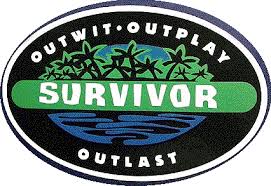
I don’t watch a lot of television, but when I’m watching it’s usually Reality TV. Some lazy Saturday mornings, I’ll veg out to Bravo for hours where the shows range from the highbrow (Top Chef) to the despicable (The Real Housewives Series) to borrow from New York Magazine’s Approval Matrix. But I love them all. In fact, I find I no longer have patience for network dramas and sitcoms. There’s too much predictability. And if I’m looking to get caught up in a plot, I’d rather watch a movie where things are wrapped up in a couple of hours, or better yet, read a book.
Everyone likes to pick on Reality TV whether they think it’s cruelly exploitative or a cesspool of pseudo-celebrity. I agree in some cases it deserves both raps. But for pure, instant gratification entertainment, I submit to you that Reality TV can’t be beat.
Reality TV has elevated the relatability of TV characters by replacing actors with average Joe’s and Jill’s. And where the Reality stars are not average, it’s given us over-the-top, have-to-be-seen-to-be-believed characters that I don’t think would be possible to create in another format. I’m talking about the “train wrecks.” It started with Anna Nicole Smith, went through several derivations on VH1 (Flavor of Love, I Love New York) and is alive and well in any Bravo Real Housewives Series (Kim from Atlanta is my personal fave). You could say on the one hand that people tune in for the voyeuristic thrill or to feel reassured about their own crummy lives by witnessing colossal acts of humiliation.
For me, train wreck Reality TV stars evoke complex emotions. Amused disbelief–can this person be for real? Unexpected moments of empathy–does the person realize how ridiculous they look and sound? Insatiable curiosity–how will she feel when she watches the playback?? But even when Reality TV doesn’t employ train wreck characters, it pulls me in through the ever present question: “If thrown in this situation, how would I react?”
As storytellers, Reality TV shows know that in order to have drama, you have to have conflict. Yes, the conflict is often manufactured. The worst example is Jerry Springer-style shows with their “surprise” guests and “shocking” confrontations. But at its best, Reality TV knows how to heap on layers of conflict, all reaching a breaking point in the last five minutes of the show. Someone gets voted out. Someone wins the big challenge. A contestant buckles under pressure and quits the show. Then like a soap opera, the story goes on leaving you hungry for what will happen next.
Reality TV subscribes to a dubious set of values. Physical beauty is everything. Vanity is good. It’s OK, even necessary, to win at the expense of other people. It can play to all of the ugliest impulses of human beings (much like the Republican party). But there are paradoxical moments that give me just enough reassurance that, as in the real world, things ain’t all bad. Sometimes the little guy wins out. When someone pushes themselves to reach a goal, there’s rewards (both intrinsic and material) to be had. In the end, Reality TV’s dogged assertion that anyone can be famous is an infectious kind of optimism. It may show people at both their best and their worst, but for me that central message is something worth tuning in for.
